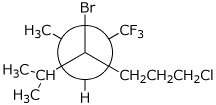Organic Chemistry I |
Exam 1 |
Professor Carl C. Wamser |
![]()
Organic Chemistry I |
Exam 1 |
Professor Carl C. Wamser |
![]()
1. (15 points) Write complete names for each of the following.
a) 
b) 
c) 
2. (15 points) Write accurate structures for the following:
a) the best chair conformation of cis-1,4-dimethylcyclohexane
b) the best Lewis structure for CH3-O-NO2
(showing all bonds, lone pairs, and formal charges - but accurate 3D is NOT
required)
c) the least stable isomer of formula C5 H10 (excluding compounds with double bonds)
d) 2-methylbicyclo[3.2.0]heptane
e) 2-chlorospiro[3.5]nonane
3. (15 points) Arrange the following in order with respect to the property indicated.
Write MOST and LEAST under the compounds with the highest and lowest values, respectively.
a) acidity
![]()
b) stability

c) boiling point
![]()
d) water solubility
![]()
e) heat of combustion

4. (10 points) Refer to the compound shown below.
What is the molecular formula?
For every sp3 carbon, indicate its classification as follows:
1° (put a circle around each atom)
2° (put a square around each atom)
3° (put a triangle around each atom)
4° (put an arrow pointing to each atom)
5. (10 points) Write accurate chair forms for both conformations
of 1,1,3-trimethylcyclohexane.
For each methyl substituent, put a circle around it if it is axial or a square
around it if it is equatorial.
Predict which conformation would be more stable.
6. (15 points) Complete each of the structures on the right so that they represent the exact same structure that is shown on the left.
a) 
b) 
c) 
7. (20 points) Use Newman diagrams to show all three staggered conformations
of 2,3-dimethylpentane, looking down the C2-C3 bond.
Label the most stable conformation as A, the next most
stable as B, and the least stable as C.
Of the possible eclipsed forms, the one that would be expected to be the highest in energy would occur in which of the following transitions?
![]()